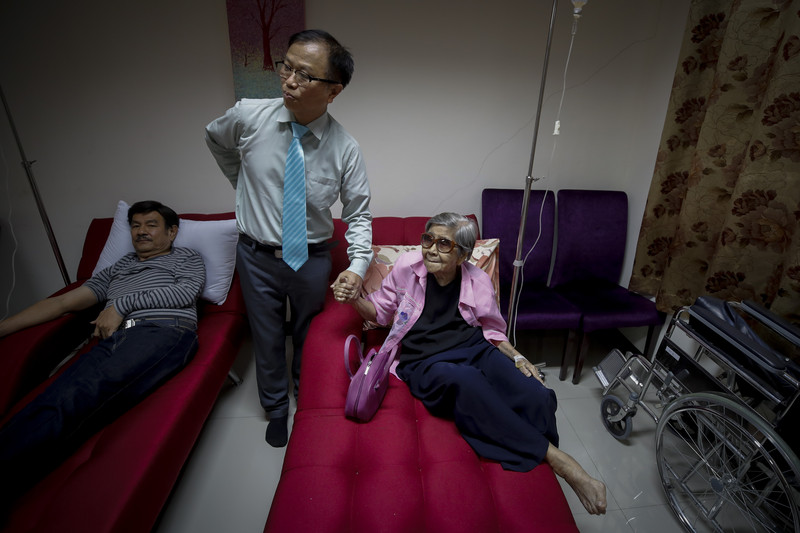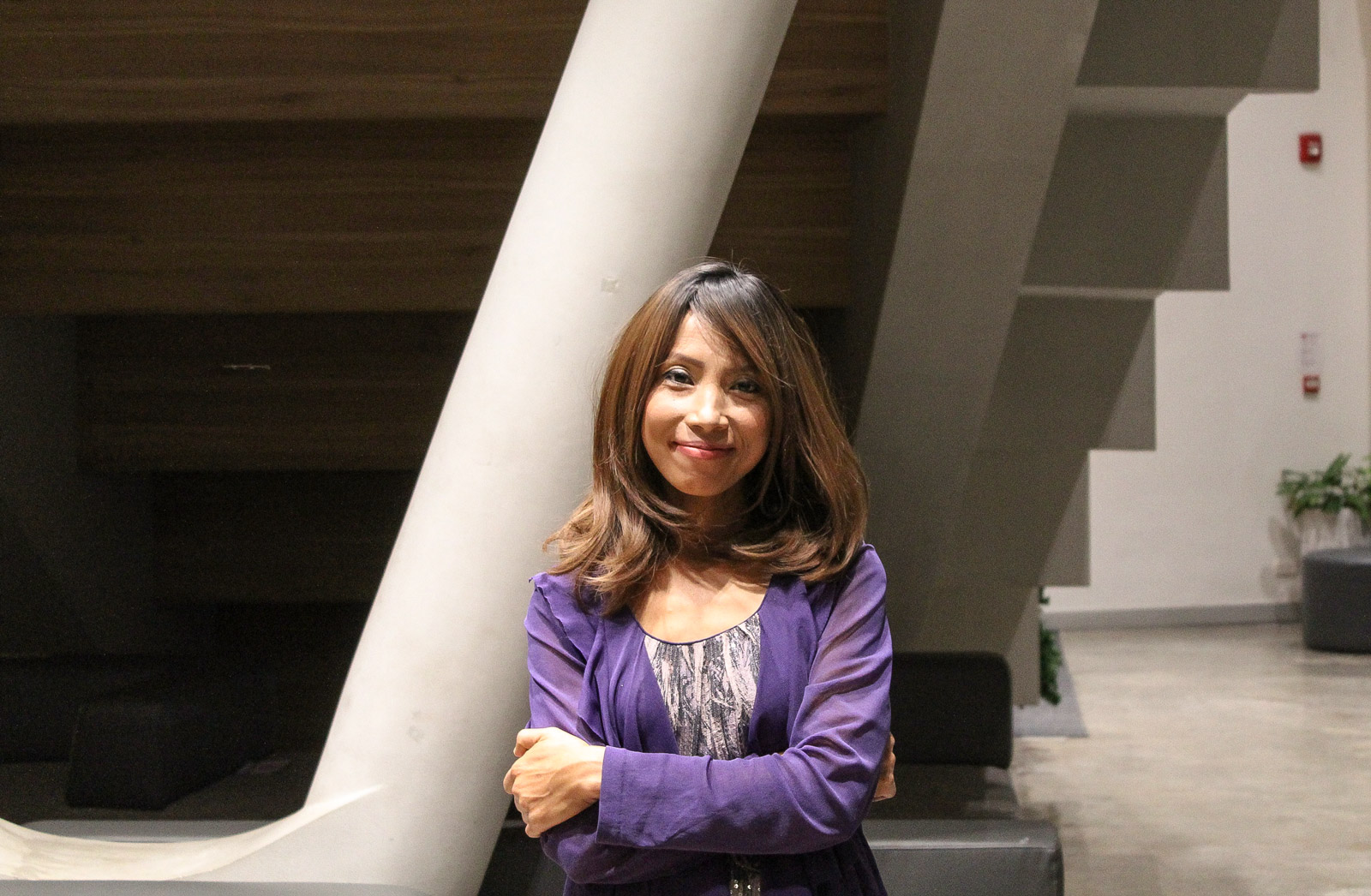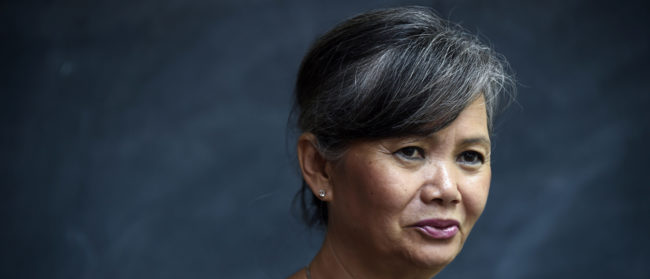Ploy Naruemon Chaingam is an accomplished documentary maker, with credits with Al Jazeera and her own production company. But the latest story she is set to tell is that of her own battle with cancer.
Like most, Ploy never believed she would be diagnosed with the disease. Cancer seemed a distant problem that impacted other people, not herself. When diagnosed in September, the 40-year-old Isaan province native had barely had a common cold in her life.
But in the coming months, Ploy is set to start shooting a documentary detailing her and other womens’ journeys with cancer in Thailand. The film, its title yet to be chosen, will discuss the long wait she faced in being diagnosed in the kingdom, the financial burden she has endured, the enduring taboos surrounding the disease in the kingdom, as well as the gendered experience of cancer worldwide.
As a single mum, her news of cancer sent chills down her spine as she wondered who would care for her two teenage sons. Ploy, petite in stature and sporting a trendy wig with blonde highlights, matter-of-factly described receiving her diagnosis in a recent interview with the Globe.
“At first, they said it ‘might be’ cancer, but it was likely. ‘Might be but likely.’ It was a big shock. I told myself, ‘this is not going to be cancer,’ but deep in my heart, I knew it was,” she said.
The already devastating news was made harder by a healthcare system stretched by the pandemic. When she first went to a government funded hospital in August after feeling a lump in her face, Ploy waited for an X-ray. When she still wasn’t able to get one after a month, she transitioned to a more expensive premium clinic with shorter waiting times for screenings, biopsies, and chemotherapy.
Ploy was lucky in one sense, being diagnosed with treatable stage-two lymphoma. But many Thais who cannot afford premium or private health care only discover their cancer after it’s too late.

Thai healthcare generally receives high marks globally, a status boosted by the kingdom’s Universal Coverage System. The Organisation for Economic Co-operation and Development noted in a 2020 overview that the Thai system provides access to more than 70% of the country’s population and promotes some of the lowest out-of-pocket payments for patients in the region.
Still, while Ploy and other cancer patients today may have access to screenings under the universal system, the limitations of the basic programme are plain to see in the face of a serious illness such as lymphoma. Ploy’s doctor told her it would’ve taken her six months, a lifetime in the fight against some forms of cancer, to get a biopsy at a government hospital. Paying for premium care, this diagnosis time was drastically slashed.
“The doctor told me that even with the same hospital, the normal clinic would take six months to get me a biopsy. But with my care, we made a decision to do the biopsy in just two weeks.”
Even my son doesn’t want to tell his friend that his mother has cancer. I should do something to break this, to be able to talk about it. And then this will encourage Thai people to talk more about their problems
Beyond the problems of finding adequate and affordable diagnosis and treatment, cancer fighters in Thailand also face a lack of emotional support. While therapy and cancer support groups are abundant in Western countries, Ploy has struggled to find such services in Thailand. Thai people, she said, consider it embarrassing to air their personal problems.
“Even my son, he doesn’t want to tell his friend that his mother has cancer,” Ploy said, adding that combatting stigma was a major motivation for her film project.
“I should do something to break this, to be able to talk about it, for my family to also talk to me through the camera so that we all understand it. And then this will encourage Thai people to talk more about their problems.”
Jane Crowder is an Australian oncology nurse who previously lived in Thailand. Noticing a weak support network for Thailand’s cancer patients when relocating to Thailand four years ago, she volunteered to help run Bangkok Breast Cancer Support, a charity and support group established in 1999. The group’s small team of volunteers, she said, are largely expat women, though a few are Thai – a ratio perhaps reflective of the levels of cultural openness about the disease.
“We’re a very small group. We support women with breast cancer, and their families, through their diagnosis, treatment, and afterwards during what we call ‘survivorship’,” she said. “I’m the only medical person, the other women are actually breast cancer survivors. They’ve been through the whole thing themselves, so they’re very familiar with the emotions that a woman will be feeling when she’s diagnosed, and at different stages of her breast cancer journey.”
The group also provides information to the public by speaking at schools and organisations, as well as handing out booklets with treatment information. Jane is the only volunteer with a medical background, while the rest are breast cancer survivors themselves.
Crowder is familiar with addressing that kind of discomfort surrounding cancer in Thailand. She believes the taboo around the illness can lead families to become overprotective of their family members who are fighting cancer, leading patients to feel they cannot live a normal life. She said part of that this overbearing approach can come from an assumption in Thailand that when someone announces they have cancer, death is just a step away.
Even when that’s the case, those attempting to comfort a cancer patient, especially one with an advanced case, can avoid the truly difficult conversations about a prognosis and are shielded from the full reality of their condition.
“From the Thai women who I’ve spoken to, I get the impression that even if you’re dying, people say ‘Don’t worry you’ll be fine,’” Crowder said.
By addressing the taboos and reality of cancer treatment among Thais head on through her film, Ploy hopes to bring more honesty to these kinds of conversations. In doing that, her documentary will also tackle cancer as a gendered experience.
A qualitative study of twenty women in rural Southern Thailand who had undergone chemotherapy found that most were left “traumatized” by its effects, with changes to their physical appearance, like hairloss, central to that. “Social support programs that meet their need[s] are salient means that could reduce the sufferings of these women,” the report concluded.
After her chemotherapy regimen caused her to lose her hair, something that Ploy said was central to her identity as a woman, she too came to the conclusion that cancer impacted men and women differently. As part of her documentary process, Ploy wants to film patients in a hospital ward to fully capture the physical impact of chemotherapy on women’s physical appearances.
That’s not something commonly discussed with doctors and patients in Thailand. I don’t know if it’s a cultural thing, if male doctors feel embarrassed about talking to a woman about their body image and sexuality
“I believe that each individual with cancer has a totally different, unique experience. But with gender, I think it affects you in a different way,” Ploy said. “With breast cancer, you [might] have to remove your breasts for example, and how can you cope with [losing] what identifies you as a woman? So that’s something I really want to explore.”
Crowder too has noticed a lack of training and sensitivity from doctors in Thailand when dealing with cancer diagnosis and treatment among women.
“I think a lot of Thai doctors treat breast cancer as a disease, but they’re not actually treating the woman as a whole person. I think they just sometimes think that emotional support is not that important,” she said. “The doctors are probably a bit oblivious to the emotions that a woman would go through with breast cancer.”
Crowder also said that gender dynamics between doctors and patients could contribute to women’s discomfort in discussing emotional issues with their doctors. While Crowder has met a female oncologist in Thailand, most oncologists, and all breast surgeons that she has met in the country, are male.
“Many women with breast cancer suffer from reduced sexuality, because they’ve had surgery which changes the way their breasts look,” she said. “That’s not something commonly discussed with doctors and patients in Thailand. I don’t know if it’s a cultural thing, if male doctors feel embarrassed about talking to a woman about their body image and sexuality.”
Contemplative of life with her own recent diagnosis, Ploy holds grand ambitions for her film, hoping it will inspire viewers to reflect on their own life choices and make changes.
“You can have more money, but you cannot have more time,” she said. “I want to make a documentary asking what the meaning of time is, and the meaning of life as well.”


